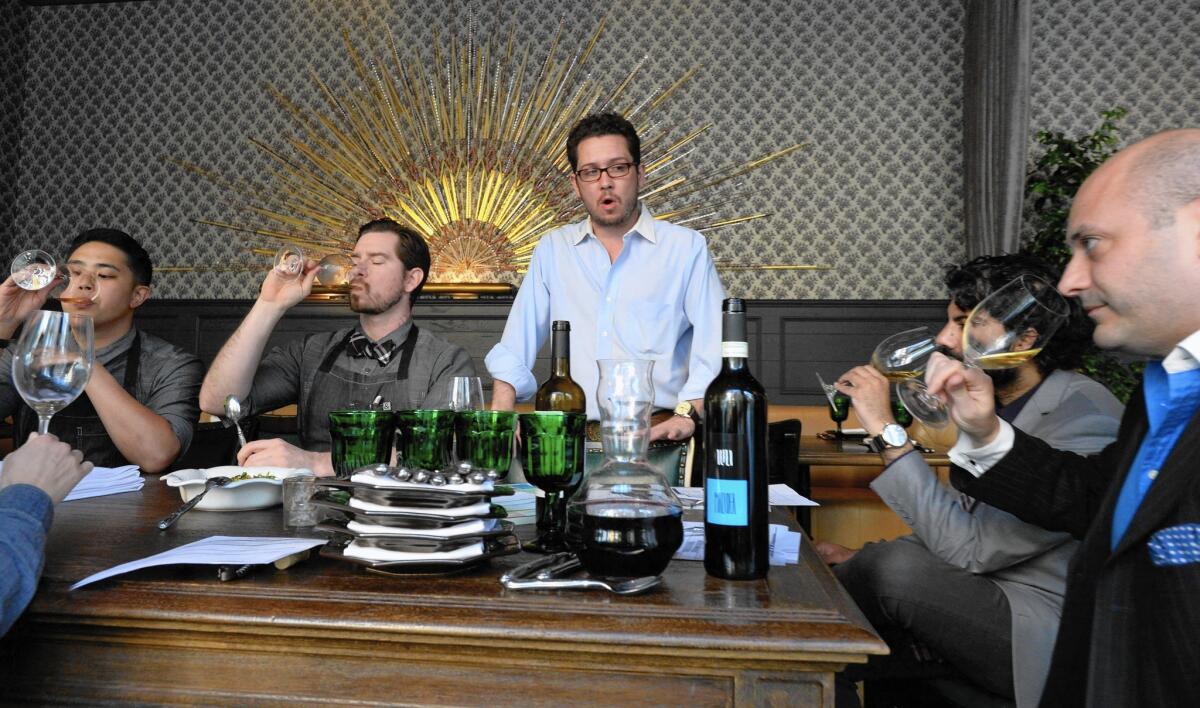In growing numbers, sommeliers uncork the wine experience for diners

- Share via
Sommeliers used to be found only in the most refined restaurants, mostly French and with Michelin stars. Invariably male, they presided over the wine cellar and intimidated guests who knew little about wine.
When the French-trained Wolfgang Puck arrived in L.A. in 1975, very few restaurants had sommeliers. “Maybe La Scala had one. Or maybe Piero Selvaggio at Valentino,” Puck says. “They wore a chain around their necks hung with a silver cup to taste the wines.”
Spago never had a sommelier until Puck hired Michael Bonaccorsi in the early ‘90s. Today, Spago’s wine staff includes wine director Philip Dunn and three sommeliers, two of them women.
We’re now in an era when even small, casual restaurants have curated wine lists. Wine trade tastings are routinely mobbed by eager young sommeliers. Hundreds more, working or not, are studying for the sommelier exams, given in four parts. There’s even a magazine called the Somm Journal for people in the profession.
Counter Intelligence: Sign up for Jonathan Gold’s weekly newsletter
Most of the old-guard sommeliers, though, never took the Court of Master Sommelier exams or felt the need for the title. Like old-school chefs, they came up through the ranks. Jeffrey Anderson at Craft studied viticulture and enology before working in restaurants in Northern California. He was wine buyer at Slanted Door in San Francisco and the Martini House in Napa Valley, and worked with chef Gary Danko in San Francisco for 61/2 years before taking the job at Craft in Century City.
What’s exciting to him in L.A. are all the small restaurants with really interesting wine lists. He cites Gjelina, the Tasting Kitchen, Terroni and Bestia for their “unique, personalized wine lists filled with idiosyncratic orange wines and obscure varietals that need an advocate.” And that’s exactly how he sees the sommelier’s job.
For Christine Veys at Sotto in West L.A., advocating for quirky southern Italian wines is the best part of her job. She started out at Sotto as a server and fell under the spell of wine director Jeremy Parzen’s all-Italian list. Since he lives in Texas and visits only once a month, she’s pretty much in charge. “Nothing gives me more pleasure than helping a guest choose a wine from our list,” says Veys. Her first move is to find out what dishes they’ve ordered. “Then I’ll pour them some tastes and help them discover new wines that they’ll love.”
It all sounds very glamorous. Sommeliers who have held the position for a while bristle at the misconceptions people have about what they do. “To the outside world, the job of sommelier has a perceived level of glamour that doesn’t exactly exist,” says Ben Aviram, general manager and sommelier at Curtis Stone’s seven-table restaurant Maude in Beverly Hills. “People think that I’m traipsing all over France, visiting vineyards and attending amazing wine tastings. In reality, it’s difficult to get time away from the restaurant and it doesn’t pay an extravagant amount,” Aviram explains.
“It’s a tremendous amount of work that involves very long hours and a lot of heavy lifting. The moments of standing around drinking grand cru Burgundy are far outnumbered by the moments spent lugging around grand cru.”
Some sommeliers move up into managerial positions and are rarely seen in the dining room. Jared Hooper, wine director at Faith & Flower in downtown L.A., says his favorite part of the job is being on the floor. “When I arrive at the table, I always get a big smile. I’m the guy arriving with the booze.”
Like Anderson, he had vineyard experience before working in wine in retail and restaurants. For a sommelier, he says, “it’s important to travel and to walk the vineyards. If you’re going to get someone to try something outside their comfort zone, you have to have a story and some insight into what creates that wine.”
A sommelier is also called upon to match wine with food. Providence, for example, has four tasting menus and wine options for each of them. A big part of sommelier Drew Langley’s job there is going over the day’s menu with chef Michael Cimarusti. The big changes come every season. “But there are always little tweaks. Proteins switch around, mushrooms change,” says Langley.
Diane Pandolfini started as a server at Drago Centro and, after she passed the first two levels of the Master Sommelier exam, moved to Drago Santa Monica as wine director. She’s held the same position at the SLS Hotel in Beverly Grove and most recently at Redbird downtown, where she created a wine program from scratch. She’s since resigned but is proud of her list there, filled with delicious, affordable wines and designed to push people’s boundaries and make the whole world of wine accessible.
In the old days, it was enough to have the classic French wines and Napa Cabernets. Now, says Puck, a sommelier has to know how to curate a list of wines that go with the food. “I always tell people you can have great food and great wine, but if they don’t go together, you don’t have anything. But if it’s a match, it’s like love — an amazing experience.”
The sommelier’s job is to make that happen.
More to Read
Eat your way across L.A.
Get our weekly Tasting Notes newsletter for reviews, news and more.
You may occasionally receive promotional content from the Los Angeles Times.










